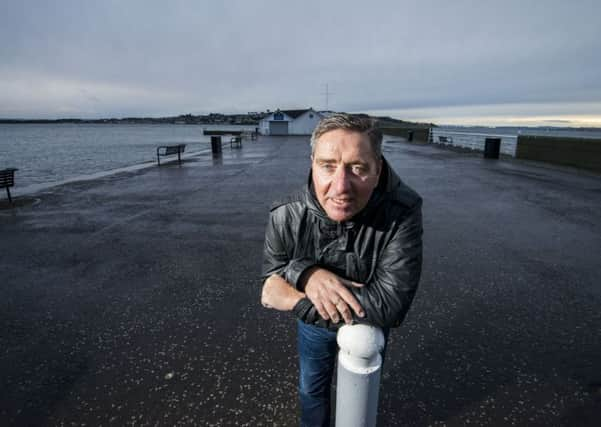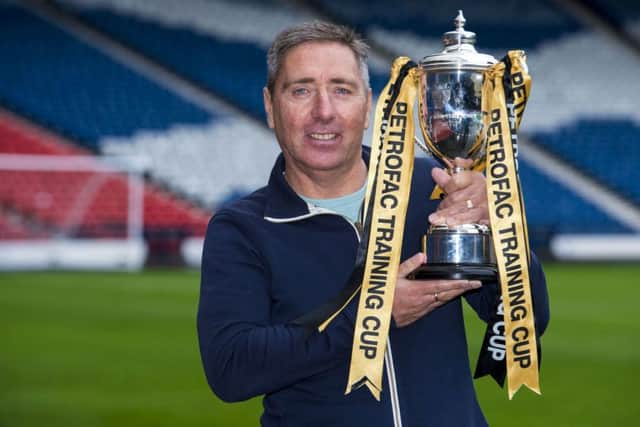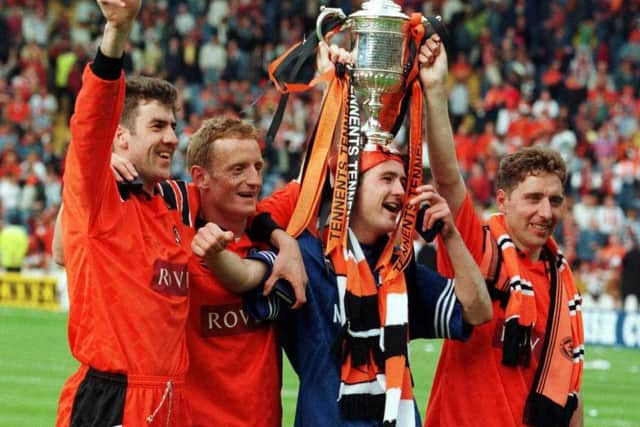Interview: Jim McInally on Peterhead and childminding


“Our last two games we’ve had problems with our floodlights,” explains the Balmoor manager. “They went dim against Stranraer who made a complaint to the SPFL and at half-time against Cowdenbeath the same thing happened. We were four-nil up at the time. Their manager was on at the referee to stop the match. The ref decided it could continue and we scored two more goals before the lights returned to full power. By that point [Cowdenbeath chairman] Donald Findlay and his directors were down at the dugouts, shouting and bawling, and they ended up making a complaint too.”
In the changing-room afterwards, despite the outcome being a 7-0 battering of the Blue Brazil by the Blue Toon, McInally and his players weren’t happy. The post-match grub at Peterhead is usually among the best in League 1 but the team, angered by the reaction of the grumpy Findlay and his well-beaten side, decided action was required.
Advertisement
Hide AdAdvertisement
Hide Ad“We normally lay on three courses and we also give the opposition complimentary tickets,” adds McInally. “When we go to Cowdenbeath we don’t get tickets and the last time we were there three pizzas came into the changing-room which, shared between 20 of us, didn’t go very far. The boys decided, and I agreed: ‘Let’s reciprocate’. Maybe it was petty, but while Albion Rovers and Ayr United lay on good food, most places will only provide a tray of sandwiches and I include Dunfermline in that. Clubs have come to expect a feed from us and that’s annoying because these are hard times in football for everyone.


“My chairman and his directors work tirelessly for our club and feel they are part of an association with the other teams, but some of them are too busy trying to get us into trouble. There isn’t enough power in our street and if the other clubs don’t know this, we went to the expense of buying our own generator, but something went wrong with it.
“It was a ridiculous afternoon. Cowdenbeath were shouting at the linesman: ‘Lux capacity, lux capacity!’ How did they know [that the lights had fallen below minimum required brightness]? I didn’t see anyone with one of those meters used in cricket. And this from a club whose changing-rooms, according to the rules, are too small.
“But the chairman refuses to cut back on hospitality. He regards it as a Highland League tradition worth preserving. He’s got a bit of class and probably I don’t have it, because I ended up getting my knuckles wrapped for sanctioning that takeaway order.” So what did Findlay, Scotland’s pre-eminent lawyer, and his entourage think of their reduced scran? A sheepish laugh from our man. “I’m afraid to say the pizzas never turned up!”
It isn’t known if Cowdenbeath stopped for chips at Stonehaven on their way back down the road, but one thing we can confirm is that Peterhead have just spend £12,000 on a replacement generator so Balmoor should be twinkling for today’s visit of Livingston in the third round of the Scottish Cup. It’s a competition their boss knows well, having lost three finals with Dundee United before ultimately triumphing in 1994. His players will be testing themselves against a Championship team, something they’d love to make a weekly occurrence come next season.


I fancied speaking to McInally after his contribution to the recent debate on the state of our game. With criticism centring on the pro-youth system, he pulled no punches, claiming unrealistic expectations of a successful career was driving the disappointed ones to depression and even suicide. What was wrong, he said, with the old way: school or boys’ club football, S-forms, the best being integrated into first teams? Funny, incisive and reflective, he doesn’t disappoint on the banks of the Tay. And if you think you’ve heard enough Brian Clough stories for one year, you haven’t.
He meets me off the train in Broughty Ferry, where he lives, and where fans of both a dark blue and tangerine persuasion – because he gave good service to both Dundee clubs – say hello every few yards. We pass a Cafe Nero. “That’s Stephen Thompson’s window,” he says, referring to the United chairman. “I think he likes to be seen.” The Costa across the road, apparently, is the rivals’ coffee-shop. Two clubs as ever separated by a street.
McInally, 51, reveals that following his comments, Gordon Strachan – who sparked the debate – phoned him up. He thought he was due for a ticking-off from the national team coach; instead Strachan quipped: “So there’s more than one dinosaur in Scottish football!” McInally, though, is not angling for a job in the crusade, should one emerge. He still loves the game, or at least the bits that don’t “scunner” him, but there are more important things in life.
Advertisement
Hide AdAdvertisement
Hide AdWhat’s important to McInally is immediately apparent. Pushing grand-daughter Lucia in her buggy, he’s child-minding today. It’s a role that fits it well with the Peterhead job and one he loves. And the day after our chat he’ll be moving his 77-year-old mother Agnes, a resident of Castlemilk, Glasgow all her days, to be near him in “the Ferry”.
“I think my perspective changed when my father died,” he explains. “Life can be tough and that was the toughest moment for me. I just thought, ‘Football’s a game – a great game – but that’s all”. This was reinforced after his first, unhappy taste of management at Morton. “I loved the people at the club but some of the fans took against me. A wee group would wait outside the ground to hurl abuse. One of the things I despise about football is the amount of hatred there is. I don’t agree with this idea that if you pay your money you can say whatever you like about anyone. Life’s tough and it’s certainly too short for all of that.”
In his trim home, a photograph of his dad Archie, who briefly played with St Johnstone and died of a heart attack aged 65 in 2003, sits next to one of McInally – although it’s difficult to discern the family likeness because of the electric-shock peroxide hairstyle the laddie sported in the 1980s. “Blame my wife Alison for that,” he smiles.
Now he’s laughing as he remembers Seville. The whole family were at Celtic’s Uefa Cup final, including his daughters Laura, mother of Lucia, and Nicola, whose boyfriend is the Dundee Utd midfielder Ryan Dow. “Alison and I were going to go with the club, where I was a youth coach at the time, but then I had the idea of taking Dad and Martin O’Neill hired us all a minibus.” Father and son had watched Celtic together since the latter was three and the old man was thrilled when his boy signed for them under Billy McNeill and was able to enjoy a quiet debut at left-back while Charlie Nicholas banged in five out of seven against Dunfermline. “Dad had never been abroad before but he loved that trip. I can still see him, disappointed with this daft wee glass of beer he’d just been sold, and saying: ‘Son, they’re no’ even trying to speak our language!’ Four months later he was gone.”
Maybe another reason McInally is happy with his part-time football life is that he’s seen at close quarters how the game can grip its participants, almost swallow them up. He played for Jim McLean and before that for Clough, and we’ll deal with the latter first.
“I was disappointed to leave Celtic but Davie Hay had replaced Billy and he didn’t fancy me. Nottingham Forest, though, were a better club and they had Cloughie - terrifying! It’s difficult to convey to younger people what a big figure he was, not just in football but British life. He’d been on Parkinson, arguing with Muhammad Ali – he was bonkers. And suddenly there was me, a boy from Castlemilk, flying down to meet him before Forest’s last game of the season against Man U at the City Ground, and him asking what I wanted to drink. ‘Coke,’ I said. ‘Are you a poof?’ he said.
“It was lunchtime, the game was at night, the team all had wine on their tables but Clough said they’d sleep it off. They did, and won 2-0. Johnny Metgod – a lovely player from Real Madrid – Gary Megson – £400,000 from Sheffield Wednesday, which was a lot of money – and me were all new boys on the same day. After the game I was in the manager’s office. Ron Atkinson appeared with this blonde and Clough said: ‘Get that tart out of here!’ I was scared enough without having to see the Man U manager get a ticking off. My first game, funnily enough, was back at Parkhead in a friendly.
“My second was at Dundee United for Jim McLean’s testimonial. Cloughie kissed Jim right on the lips – he didn’t like that –in between trying to tap Richard Gough in the corridor. That was Gary Megson’s first game – and his last. He threw up in the changing-room. ‘I always make myself sick before games, Boss’, he said. Clough said, ‘You’ll never do it at my club again’, and subbed him at half-time. It turned out Clough hated Gary’s dad, Roy Megson, from having played against him. Gary had a pretty rotten time for as long as he was there. Clough would turn round in his chair and Gary would have to speak to his back.” McInally fared better, being one of Clough’s favoured “young men”, the manager using the player as the go-between to lure John Robertson back after the burly wingman slouched off to Derby County with Peter Taylor when the great managerial duo broke up. “He’d say to me, ‘How’d the fat lad?’ and ‘Get fatty to come and see me’.” McInally, whose fellow City Ground Scots included Ian Wallace and Colin Walsh, was then asked to put on his sweetest smile to sell the place to Hibernian’s Brian Rice.
Advertisement
Hide AdAdvertisement
Hide AdHe did this willingly because he believed in the man. “Cloughie was drinking a lot but it wasn’t affecting his management. Five minutes from him would be the most inspirational words you could hear. He had his flaws but he was a genius.” Living in Nottingham’s Balmoral Hotel, McInally was invited to spend Christmas with the Cloughs. “That was bizarre. Cloughie did the cooking. He was always trying to get me to eat vegetables, which I hated. Every pre-match lunch he would be on at me. That day he presented me with a plate of Brussels sprouts and I had to swallow them all. I was stuffed, and then he went ‘I’ve just remembered the drumsticks in the oven’ and I had to eat them too.
“Then: ‘Hey, I’ve got a video of us beating Celtic’. He was always kidding on he was a Celtic man in his green top and this was the Uefa Cup the year before I joined. Poor Barbara, his wife, who was lovely, and Nigel, who I got on well with – they had to watch, too. Ian St John introduced it and Cloughie – pissed by then – was shouting at him: ‘You thought we would lose’!”
McInally’s favourite waif-and-stray story concerns a game in England’s north-east and two bonfire-night guisers. “We were playing Newcastle United, staying in Sunderland, and these two scruffy lads – poor wee souls in need of a bar of soap – turned up at our hotel but Cloughie had sent us out for a stroll after dinner. ‘Come back tomorrow’, they were told, and they did. ‘Now then, young men!’ said Cloughie, and sat them down with us for the pre-match lunch. He handed them big fancy menus – you could see the maitre’d in his dickie-bow was raging – but they said: ‘Chips is fine, Brian’. We were killing ourselves laughing. Then Brian said: ‘Would you like to come to the game?’ “I wasn’t playing that day so I was in the dugout with Cloughie and the boys, who were brothers. He said: ‘Jim, phone their mother and tell them the lads are coming home with me’. ‘Our mum doesn’t have a phone’, they said.
‘So there was me, leaving the match to find a payphone, calling up a neighbour to say that Brian Clough had already whisked the boys off to the football 20-odd miles away and next he wanted them to come and live with him for a week in Derby!” Years later, McInally was looking up old pals in Nottingham. “This teenager came up and said: ‘You won’t remember me’. Cloughie had given him a job in his post office.” The same brother revealed recently he’d ended up living with the Cloughs for four years. Now he was writing a book on how they’d saved him from poverty.
McInally last saw Clough at the Tennent’s Sixes. “He gave me a kiss. I loved the man.” By then he was at Dundee United, having embarked on what would be a longer, more successful but also more difficult relationship with another of football’s brilliant, complicated alchemists. He has another Christmas story, this one less cheering.
McLean had switched from manager to chairman but if anything their fall-outs worsened. Telling Ivan Golac he didn’t want to play for the first team, McInally got booked with the reserves and was fined £800. “My wages in December were £11 and £12. I had to cash in a policy so the kids could have Christmas. Then two £10 Toys R Us vouchers arrived - ‘compliments of the season from the club’. I told Jim where he could stick them.
“Listen, he was a fantastic coach who did wonderful things with that team.” Not least was his masterminding of the Arabs’ march to the 1987 Uefa Cup final, beating Barcelona home and away. “But his man-management wasn’t the greatest. We had a helluva lot of bust-ups, although some of my team-mates actually thought I got on well with him. And my dad, who loved him, always took Jim’s side, saying: ‘You should make your peace with him’. Well, Jim lives nearby, he’s not a well man now but we’ve made our peace. He admits he was too hard on us, that the team could maybe have achieved more if he hadn’t been so tough. That’s the big question, though: would we?”
Who’d be a football manager? Jim McInally for one, and he can look forward to Peterhead’s first-ever senior cup final – the Petrofac in April – hoping they will meet Rangers. “Beating them at Ibrox two seasons ago was one of my best days. We’ve got a photograph of the scoreboard in our clubhouse.” Right now, though, his main concern is the arrival in Broughty Ferry of his dear old mum. “She’s going to be able to see the sea from her window. After Castlemilk I hope that’s not too strange for her.”